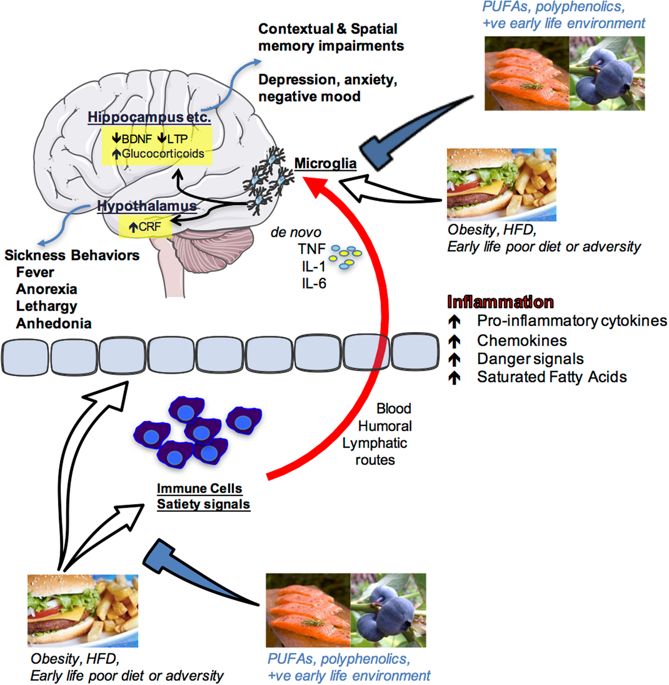npj Science of Food ( IF 6.3 ) Pub Date : 2017-12-06 , DOI: 10.1038/s41538-017-0008-y Sarah J Spencer 1 , Aniko Korosi 2 , Sophie Layé 3 , Barbara Shukitt-Hale 4 , Ruth M Barrientos 5

|
More than one-third of American adults are obese and statistics are similar worldwide. Caloric intake and diet composition have large and lasting effects on cognition and emotion, especially during critical periods in development, but the neural mechanisms for these effects are not well understood. A clear understanding of the cognitive–emotional processes underpinning desires to over-consume foods can assist more effective prevention and treatments of obesity. This review addresses recent work linking dietary fat intake and omega-3 polyunsaturated fatty acid dietary imbalance with inflammation in developing, adult, and aged brains. Thus, early-life diet and exposure to stress can lead to cognitive dysfunction throughout life and there is potential for early nutritional interventions (e.g., with essential micronutrients) for preventing these deficits. Likewise, acute consumption of a high-fat diet primes the hippocampus to produce a potentiated neuroinflammatory response to a mild immune challenge, causing memory deficits. Low dietary intake of omega-3 polyunsaturated fatty acids can also contribute to depression through its effects on endocannabinoid and inflammatory pathways in specific brain regions leading to synaptic phagocytosis by microglia in the hippocampus, contributing to memory loss. However, encouragingly, consumption of fruits and vegetables high in polyphenolics can prevent and even reverse age-related cognitive deficits by lowering oxidative stress and inflammation. Understanding relationships between diet, cognition, and emotion is necessary to uncover mechanisms involved in and strategies to prevent or attenuate comorbid neurological conditions in obese individuals.
中文翻译:

引人深思:营养如何影响认知和情绪
超过三分之一的美国成年人肥胖,全球统计数据相似。热量摄入和饮食结构对认知和情绪具有巨大而持久的影响,尤其是在发育的关键时期,但这些影响的神经机制尚不清楚。清楚地了解导致过度消费食物的认知情绪过程可以帮助更有效地预防和治疗肥胖。这篇综述探讨了近期将膳食脂肪摄入量和 omega-3 多不饱和脂肪酸膳食失衡与发育中、成人和老年大脑炎症联系起来的研究。因此,生命早期的饮食和压力可能导致终生认知功能障碍,并且有可能通过早期营养干预(例如,必需的微量营养素)来预防这些缺陷。同样,大量摄入高脂肪饮食会使海马体对轻微的免疫挑战产生更强的神经炎症反应,从而导致记忆缺陷。饮食中 Omega-3 多不饱和脂肪酸摄入量过低也会导致抑郁症,因为它会影响特定大脑区域的内源性大麻素和炎症通路,导致海马小胶质细胞的突触吞噬作用,从而导致记忆丧失。然而,令人鼓舞的是,食用富含多酚类物质的水果和蔬菜可以通过降低氧化应激和炎症来预防甚至逆转与年龄相关的认知缺陷。了解饮食、认知和情绪之间的关系对于揭示肥胖个体的共病神经系统疾病的机制和预防或减轻神经系统疾病的策略是必要的。







































 京公网安备 11010802027423号
京公网安备 11010802027423号